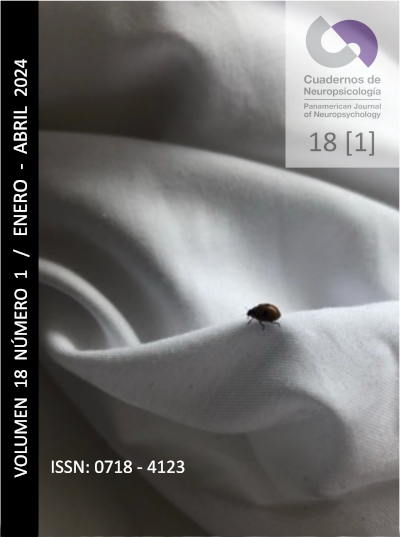Aplicação remota do mini-addenbrooke’s cognitive examination: estudo piloto
Abstract
RESUMO
Introdução: A avaliação neuropsicológica à distância é um meio para atenuar as barreiras no acesso a serviços especializados.
Objetivos: O objetivo central é a comparação da aplicação presencial e através de videoconferência do Mini – Addenbrooke’s Cognitive Examination (MACE).
Métodos: A amostra é constituída por indivíduos com mais de 65 anos. Foi administrado o MACE presencialmente e por videoconferência de forma cruzada e randomizada, com um intervalo médio de 2 semanas entre aplicações.
Resultados: Não foram encontradas diferenças significativas entre as duas formas de aplicação (T=24; erro padrão=12,69; p=.238). O coeficiente de correlação interclasse entre as duas formas de aplicação é significativo (ICC=.819; p=.003). A confiabilidade é boa (α=.810). O MACE não apresentou correlações com outras variáveis.
Conclusões: A aplicação à distância do MACE demonstra características similares à aplicação presencial. O desempenho remoto na prova não foi influenciado pela dimensão do monitor, velocidade de ligação ou perturbação da ligação, pelo que se afigura como um método seguro para avaliação neurocognitiva à distância
Palavras-chave: Teleneuropsicologia; Avaliação Neuropsicológica; Neuropsicologia.
RESUMEN
Introducción: La evaluación neuropsicológica a distancia es una forma de reducir las barreras para acceder a servicios especializados.
Objetivos: El objetivo principal es comparar la aplicación presencial y por videoconferencia del Mini – Examen Cognitivo de Addenbrooke (MACE).
Métodos: La muestra está compuesta por individuos mayores de 65 años. MACE se administró presencialmente y por videoconferencia de forma cruzada y aleatoria, con un intervalo promedio de 2 semanas entre aplicaciones.
Resultados: No se encontraron diferencias significativas entre las dos formas de aplicación (T=24; error estándar=12,69; p=0,238). El coeficiente de correlación interclase entre las dos formas de aplicación es significativo (ICC=.819; p=.003). La fiabilidad es buena (α=.810). MACE no evidenció correlaciones con otras variables.
Conclusiones: La aplicación remota del MACE demuestra características similares a la aplicación presencial. El rendimiento remoto en la prueba no fue afectado por el tamaño del monitor, la velocidad de conexión o la interrupción de la conexión, por lo que parece ser un método seguro para la evaluación neurocognitiva remota.
Palabras-clave: Teleneuropsicología; Evaluación Neuropsicológica; Neuropsicología.
ABSTRACT
Introduction: Remote neuropsychological assessment is a way to reduce barriers in accessing specialized services.
Objectives: The main objective is to compare the application in person and via videoconference of the Mini – Addenbrooke’s Cognitive Examination (MACE).
Methods: The sample consists of individuals over 65 years old. MACE was administered face-to-face and by videoconference in a cross-over and randomized manner, with an average interval of 2 weeks between applications.
Results: No significant differences were found between the two forms of application (T=24; standard error=12.69; p=.238). The interclass correlation coefficient between the two forms of application is significant (ICC=.819; p=.003). Reliability is good (α=.810). MACE did not show correlations with other variables.
Conclusions: The remote application of the MACE demonstrates similar characteristics to the face-to-face application. Remote performance in the test was not influenced by monitor size, connection speed or connection disturbance, so it appears to be a safe method for remote neurocognitive assessment.
Key-words: Teleneuropsychology; Neuropsychological Assessment; Neuropsychology.
Downloads
How to Cite
Issue
Section
License
Articles published in this journal are protected under the Creative Commons Attribution-NonCommercial-ShareAlike 4.0 International (CC BY-NC-SA 4.0) license. This means that authors retain full rights over their research and publications at all times. As a journal, we fully respect and promote the principles of open access established by this license, allowing the work to be shared, adapted, and distributed for non-commercial purposes, provided that appropriate credit is given to the authors and any derivative works are licensed under the same terms.
Authors are responsible for obtaining the required permission when they wish to reproduce part of the material (figures, etc.) from other publications.
Likewise, CNPs allows authors to host in their personal sites or other repositories that they deem convenient the Final and Definitive Version of the published article with the format assigned by the journal. In no case do we allow access to preprints of the article under evaluation or already published.
When submitting an article to CNPs you are aware that all the contents of CNPs are under a Creative Commons License. In which it is allowed to copy and share the contents freely, always making reference to the origin of the publication and its author.












